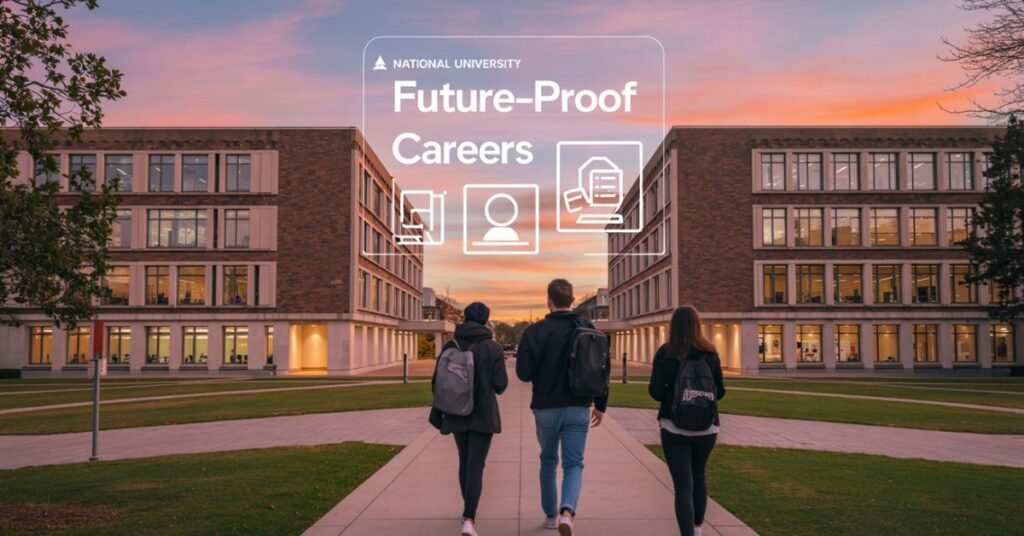
As a graduate from National University (NU), you’re stepping into a job market that’s evolving faster than ever, thanks to rapid AI advancements. With AI transforming industries across the US, many traditional roles are shifting, while new opportunities are emerging in tech, healthcare, and sustainable fields. If you’re wondering how to leverage your NU degree for a thriving career—especially in this AI-driven era—this post is your guide. We’ll explore top career paths tailored for NU alumni, backed by the latest insights on AI’s impact, and offer practical tips to help you stand out. Whether you’re from engineering, nursing, or business programs, these paths can position you for success and long-term growth.
Understanding AI’s Impact on the US Job Market
AI isn’t just a buzzword—it’s reshaping employment on a massive scale. By 2030, up to 30% of current US jobs could be automated, with 60% seeing significant task changes due to AI integration. This means roles involving routine tasks are at risk, but it’s also creating demand for skills in AI, data analysis, and ethical tech implementation. For instance, AI could displace around 9% of the workforce over the next decade, yet it might boost US productivity by 1.7% to 3.5%, adding up to $1 trillion to the GDP annually.
On the flip side, AI is fueling job growth in high-demand areas. LinkedIn’s 2025 report highlights AI engineer and AI consultant as the fastest-growing roles, driven by tech integration across sectors. Industries like healthcare, finance, and automotive are hiring AI-savvy professionals to innovate and stay competitive. For NU graduates, this is a golden opportunity: your education emphasizes practical skills that align with these trends, helping you adapt to AI’s disruptions while capitalizing on new openings.
Top Career Paths for National University Graduates
National University offers unique programs that prepare you for in-demand fields, especially amid AI advancements. Based on NU’s offerings and current market trends, here are some standout paths. We’ve focused on roles that blend your degree with AI opportunities, including salary insights and growth projections from reliable sources.
1. Engineering Management Roles
If you hold an MSEM (Master of Science in Engineering Management) from NU, you’re equipped for leadership in tech-driven projects. AI is automating engineering tasks, but it creates needs for managers who can oversee AI systems.
-
Project Manager or Technology Manager: Lead teams in implementing AI tools for efficient operations. Median salary: Around $120,000, with 6% job growth by 2033.
-
Design Engineer or Firmware Engineer: Use AI for product design and optimization. These roles are booming as companies adopt AI for innovation.
AI’s role here? It enhances productivity, but human oversight is crucial—your NU training in management principles gives you an edge.
2. Nursing and Healthcare Specializations
NU’s MSN (Master of Science in Nursing) program positions you for advanced roles in a sector where AI is revolutionizing diagnostics and patient care. Despite AI automation fears, nursing demand is skyrocketing due to an aging population and post-pandemic shortages.
-
Nurse Practitioner or Clinical Nurse Specialist: Leverage AI for personalized medicine and data-driven care. Median salary: $115,000, with 26% growth by 2030.
-
Nurse Educator or Psychiatric Nurse Practitioner: Train others on AI-integrated tools, addressing the RN shortage projected to intensify.
AI impact: Tools like predictive diagnostics are complements, not replacements, boosting job stability.
3. Cybersecurity and IT Forensics
With NU’s Bachelor’s in Cybersecurity and Forensics, you’re ready for a field exploding due to AI threats and data needs. AI is both a tool and a risk—cyber pros who understand it are in high demand.
-
Cybersecurity Analyst or Digital Forensic Investigator: Protect against AI-powered attacks. Job growth: 32% by 2033, with salaries averaging $112,000.
-
IT Security Consultant: Advise on AI ethics and secure systems.
Why now? AI increases cyber risks, creating urgent needs for skilled defenders.
4. Aviation and Construction Management
NU’s unique Bachelor’s programs in Aviation Management and Construction Management align with AI’s push for efficiency and sustainability.
-
Airline Operations Manager or Airport Manager: Use AI for route optimization and safety. Salaries start at $100,000+, with steady demand.
-
Construction Project Manager or Sustainable Construction Specialist: Apply AI for project planning and eco-friendly builds. Growth: 5% by 2033.
AI enhances these fields by automating logistics, reducing errors, and promoting green practices.
5. Energy Management and Sustainability
NU’s Energy Management degree taps into the renewable boom, where AI optimizes energy use.
-
Energy Manager or Renewable Energy Analyst: Implement AI for efficient grids. Median salary: $95,000, with 8% growth.
-
Sustainability Consultant: Advise on AI-driven eco-strategies, a rising role per LinkedIn.
AI’s influence: It stabilizes employment in energy during downturns by improving resource allocation.
Emerging AI-Focused Paths for Any NU Graduate
No matter your major, upskilling in AI can open doors. Consider:
-
AI Engineer or Consultant: Top-growing roles with salaries over $130,000.
-
Data Scientist or Machine Learning Specialist: Analyze AI data for insights. Demand up 35% by 2032.
These align with NU’s emphasis on adaptable skills, helping you pivot amid AI changes.
How to Navigate AI Advancements as an NU Graduate
Feeling overwhelmed by AI’s pace? Here’s how to problem-solve and thrive:
-
Upskill Strategically: Take AI courses or certifications—NU alumni often access resources for this. Focus on tools like machine learning to boost employability.
-
Build a Network: Attend career fairs or use LinkedIn to connect with AI pros. Remember, 40% of employers plan AI automation, so highlight your adaptability.
-
Target High-Growth Sectors: Aim for healthcare, tech, and sustainability, where AI creates more jobs than it displaces.
-
Address Job Loss Risks: If your role involves routine tasks, pivot early—retraining could be key for 20 million US workers by 2028.
-
Stay Ethical: As AI raises concerns about bias and transparency, emphasize ethical practices in your applications.
By focusing on these, you’ll turn AI challenges into career advantages.
In this AI era, National University graduates are uniquely positioned for success. Your practical education aligns with high-demand fields like engineering, healthcare, and cybersecurity, where AI is a booster, not a barrier. Start exploring these paths today, upskill where needed, and watch your career soar. What’s your top career pick from this list? Share in the comments—we’d love to hear!


